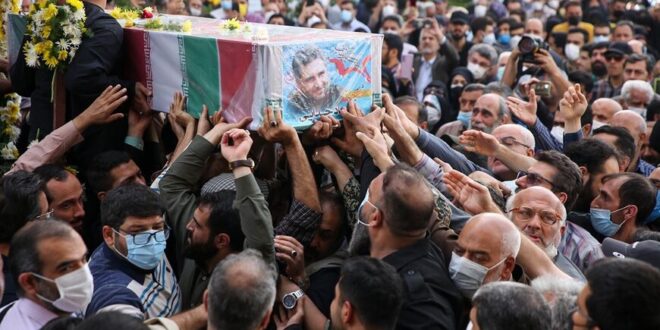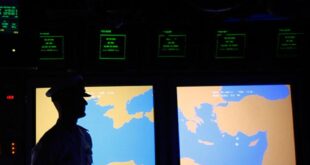In a letter, Iran obliquely blamed Israel for the killing, the last in a chain of similar attacks that Tehran has vowed to avenge.
Iran’s UN Ambassador Majid Takht-Ravanchi called on the world body to condemn the “terrorist assassination” last week of Hassan Sayyad Khodaee, a colonel in the Quds Force, which is the overseas branch of Iran’s hard-line Islamic Revolutionary Guard Corps (IRGC).
In a letter to UN chief Antonio Guterres, the Iranian envoy said the assassination fell within a “systematic” scheme in which “innocent Iranian civilians and scientists” are killed to advance the “illegitimate” foreign policy goals of “certain regimes.”
Takht-Ravanchi referred the United Nations to its original charter and warned that “dangerous consequences” were lying ahead for global peace, as civilians of other countries could be next in line for “state terrorism” practiced by the same regimes. The diplomat also promised that the Islamic Republic will go out of its way “to hold the perpetrators of this terrorist crime and their supporters accountable.”
Sayyad Khodaee was gunned down by two motorcyclists in a central neighborhood on Sunday, according to Iranian officials. The Islamic Republic has described the colonel as a “shrine defender,” a title it typically grants to Quds Force members fighting in Syria to shore up its ally President Bashar al-Assad.
Iran’s intelligence community and the Interior Ministry have said they are investigating the killing. Several Iranian officials have directly implicated Israel for the attack, with President Ebrahim Raisi promising “inevitable revenge.”
Crowds attending a state funeral for the slain colonel Tuesday demanded revenge while chanting the familiar slogan of “death to Israel.” In attendance was IRGC commander Hossein Salami, who has vowed that the Iranian “harsh response will definitely make the enemy regret” its deed.
Israeli news outlets have linked Sayyad Khodaee to what they characterize as a series of novel Quds Force tactics, going after a hit list of Israelis in international operations.
On Wednesday, The New York Times quoted an American intelligence source as saying that Israel has confirmed to Washington that it carried out the Tehran attack. Iranian officials have yet to comment on the report, but the country’s news outlets were unsurprisingly quick to pick up the story as the “Zionist regime’s confession of the assassination of Martyr Sayyad Khodaee.”
Iran has in the past pointed a finger to Israel for similar attacks on its soil, from sabotage at its nuclear sites to a chain of assassinations targeting its nuclear scientists. In late 2020, the country’s top missile expert, Mohsen Fakhrizadeh, was killed in what was seen as a sophisticated operation outside the capital Tehran. Iranian authorities pledged to avenge that killing as well.
With tensions simmering in the past two years, the archenemies have been locking horns at multiple levels and in different forms of confrontation, often taking their battle to third-party locations. Back in March, the IRGC showered a building in neighboring Iraqi Kurdistan with ballistic missiles, claiming that the place was being used by Israeli intelligence for anti-Iran purposes. Kurdish officials denied the account and criticized Iran for violating their sovereignty.
On May 26, Iran’s Defense Ministry announced, with few details, that it was probing the causes of an “incident” that left a staff member dead and another injured at one of its “research centers” in Parchin.
The sensitive area south of the capital Tehran hosts a vast military compound. It was also at the core of 2014 reports by the UN nuclear watchdog that confirmed “military dimensions” to the Islamic Republic’s atomic program, a charge that Tehran has dismissed.
 Eurasia Press & News
Eurasia Press & News




